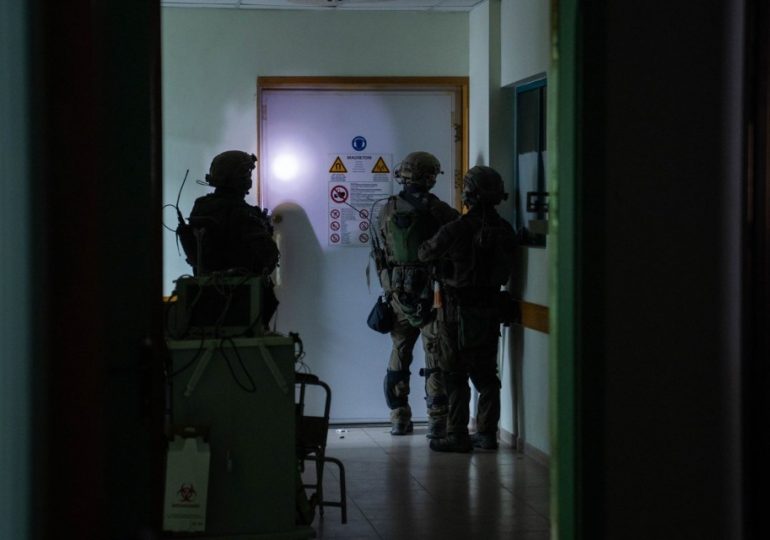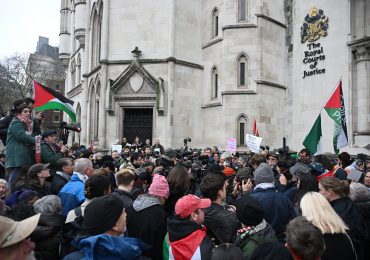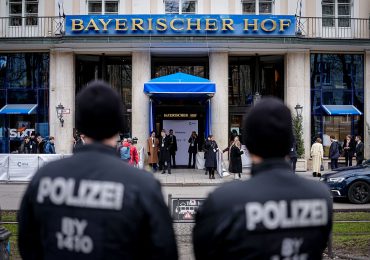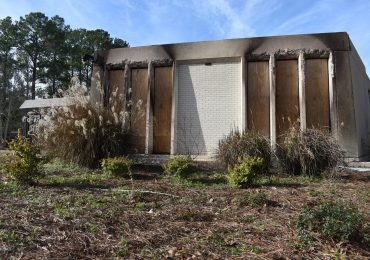THE world’s eyes are on the Shifa hospital in Gaza, and yesterday I got the closest any Western journalist has yet got to this focus of the world’s attention.
At one hour’s notice the IDF yesterday morning gave permission for a small number of journalists to go into Gaza with them to see the full scale of the war that Israel is waging against the terrorists of Hamas.
IDFIDF troops are continuing the precise and targeted operation against Hamas in the al Shifa Hospital[/caption]
IDFTroops located a room with technological assets, along with military and combat equipment[/caption]
ReutersThousands of patients, doctors and displaced Palestinians have been trapped inside the besieged al Shifa Hospital for weeks[/caption]
We entered through the same part of the fence that the Hamas terrorists broke through on the morning of October 7 to carry out their massacres.
Today this opening is one of the routes that the Israeli military are pouring through as they continue their relentless assault on the terrorist group.
Almost as soon as we got into Gaza we came across evidence of the intense fighting that has been going on in recent days.
One of the first villages we came to had been almost destroyed.
But the Israelis had just found something interesting here.
It was one of the entrances to the vast underground tunnel network that Hamas has spent years constructing beneath Gaza.
This tunnel entrance had just been discovered.
Each of these entrances connects to the vast underground tunnel network in which Hamas are hiding.
The Israelis also believe that it is in the tunnel system beneath our feet that the 240 Israelis kidnapped on October 7 are likely being held.
Many of these tunnel entrances are booby-trapped by Hamas.
Several Israeli soldiers were killed just a few days ago trying to open one such entrance.
Yesterday, as we were there, the IDF showed that they are taking no chances.
Several detonation experts carefully winched a large amount of dynamite down through the entrance to the tunnel and, after getting us to stand behind a destroyed nearby building, they blew it up.
The massive explosion shook the ground under our feet.
Soon we got back into our vehicles and started to enter deep into Gaza.
All around there were the explosions and firing we had been told to expect before we went in.
The Israelis were still carrying out airstrikes in the northernmost part of the strip and great plumes of smoke could be seen rising up after each strike.
But there was other firing too. Tank shells and anti-tank munitions.
As well as intermittent fire fights between the two sides using heavy machine guns and other artillery.
But we pressed on to our destination.
Our aim was to get to Salahadin Street. This has become one of the main north-south routes for the citizens of Gaza to move down.
Every day thousands of Gazans move this way.
Twenty-five thousand moved this way the day before. Fifty thousand the day before that.
As we approached the highway we were warned about the ongoing military activity here.
Fire can come from all sides.
Obviously in recent days the Israelis have continued their massive bombing of Hamas targets in the north of the strip.
But Hamas themselves have been trying to stop the Gazans leaving the north of the Gaza strip.
They want to avoid a hand-to-hand fight that is just between the IDF and Hamas.
As a result Hamas have actually been gunning down civilians trying to flee.
Roadways like this one have been strewn with the bodies of Gazans trying to follow the IDF´s warning to move south so that Hamas can be isolated in the north.
The resulting scene I saw was of course a tide of human misery.
But it is a misery brought upon the people of Gaza by Hamas when they decided to break into Israel on October 7 by land, air and sea.
Around 1400 Israelis were slaughtered that day. The largest massacre of Jews since the Holocaust.
And the Israelis do not intend to forget it or allow Hamas to remain in the Gaza.
Especially not since Hamas’s leaders have said they wish to repeat the October massacre again and again.
At Salahadin Street we got the first glimpse of the tide of Palestinians leaving their homes and moving south.
Men, women and children were standing in line as the IDF stood guard.
This is the “humanitarian corridor” that the Israelis have set up to allow Palestinians to leave the zone of the most intense fighting and get to safety.
The process is an incredibly delicate one and every movement has to be carefully watched.
The Israelis have three objectives. The first is to allow safe passage to innocent Palestinians who do not want to get caught up in the war.
The second is to prevent Hamas terrorists – let alone their leaders – spiriting themselves away among the local population.
The third is to avoid any of the 240 Israeli hostages being taken deeper into Gaza along this route.
As a result the messages broadcast out at the crowds by megaphone were in Arabic and Hebrew.
The messages in Arabic advised the people to raise their hands if they understood the messages and to move slowly forward past the checkpoint. Some of the Palestinians waved white flags.
A number of young men were pulled out of the crowd and put aside for a secondary check.
Young men of fighting age are clearly of interest to the Israelis and need more checks than most to ensure they are not bringing weapons down to extend the war to the south.
But the messages in Hebrew were more heart-breaking.
These told the crowd to make themselves known if they were Israeli.
They also said that if there were any Israeli children in the crowds who understood Hebrew they should jump up and make themselves known so that they could be rescued.
Hamas is holding around forty Israeli children.
The day before I had interviewed the parents and relatives of some of these children.
One of Israel’s main war-aims is to get them back.
The convoy of Palestinians moved steadily forward.
But Israeli troops crouched in formation everywhere, guns aimed at the bombed-out buildings surrounding us.
We were warned of snipers in the area who might target anyone in the area – civilians as well as military.
As it was, the whole time I was there the convoy moved peacefully forward past the checkpoint.
Of course this movement itself is being criticized by the international community.
As is the Israelis moving in on the Al Shifa hospital, just up the road from where I was.
The Israelis say that the hospital is not only one of the main headquarters of Hamas in the Gaza, but that it is also one of their main weapons depots.
That Hamas still have plenty of rockets to fire is clear. Just the night before they fired multiple rockets into Israel, including into Tel Aviv where everyone was forced once again to flee to the air raid shelters and a number of people were injured.
Still, much of the international community refuses to accept the Israeli view on this.
This is despite the fact that multiple non-Israeli sources have for years acknowledged just the same facts.
For instance, in 2014, almost a decade before the current conflict, Amnesty International said that Hamas used the hospital as a place to imprison, torture and execute Palestinians.
Not least Palestinians it accuses of belonging to rival Palestinian factions.
Amnesty is not known for being pro-Israel. So why have the BBC and other international media spent recent days pretending that the hospital is a purely humanitarian location with no connection to Hamas?
It is a mystery, and one which the IDF and others are scornful about.
They say that Hamas does not only use the hospital as an HQ and weapons depot but as a place to keep Palestinians as human shields.
This is a long-time tactic of Hamas, which regularly places its leadership and weapons depots beneath hospitals, schools and other “soft” targets in the knowledge that if Israel strikes them it will reap international condemnation.
The humanitarian corridor is busiest in the morning, but it continues until dark. And as dusk started to descend over the Gaza the tide of people began to slow. It was also time to leave.
If the day-time in Gaza is intense, the nights can be even worse, with the direction of fire and blasts becoming increasingly hard to determine.
As we headed back towards the Gaza border intense fire-fights began to break out to our side: machine-gun battles, mortars, and other exchanges of fire.
It is right that the world focuses on what is happening here. But it is also right that it remembers why it is happening.
As soon as you go back past the security fence that separates Gaza from Israel you get the clearest possible reminder of this.
The first community you pass is Be´ eri.
This community was utterly decimated on October 7.
Its citizens were hunted door to door for hours.
Around 130 of its members were shot, tortured, mutilated, raped, kidnapped or burned alive during the almost 12 hours in which Hamas terrorists ripped through the Kibbutz.
Today it is a ghost town, its houses all burned out or destroyed by explosives.
It is a stark reminder of why Israel is doing what it is doing in Gaza. Be´eri was a community which – like many nearby kibbutz – was dominated by peace activists.
They included a 74-year old woman – Vivian Silver – who spent her life working as a “peace activist”.
Such people dreamed of – and worked at – living in peace with their Palestinian neighbours. But it was a dream that was shattered forever on the morning of October 7.
The world is calling for a ceasefire in Gaza. But a ceasefire of a kind existed until the morning of October 7.
All the horrors that are now happening inside Gaza are the result of Hamas´s decision to wage war – even against the people most dedicated to peace.
IDFAn operational command center, weapons, and technological assets found in the MRI building of the Shifa Hospital in Gaza City[/caption]
IDFIn another department, soldiers located an operational command centre and technological assets belonging to Hamas[/caption]
Leave a comment
















